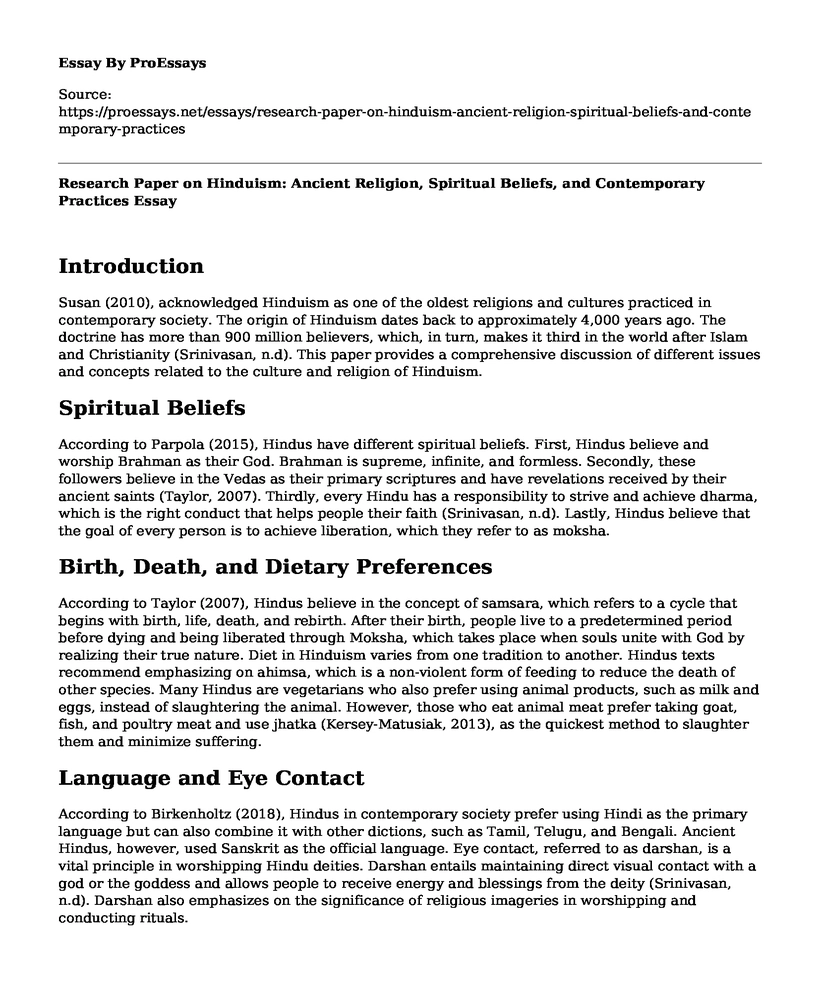Introduction
Susan (2010), acknowledged Hinduism as one of the oldest religions and cultures practiced in contemporary society. The origin of Hinduism dates back to approximately 4,000 years ago. The doctrine has more than 900 million believers, which, in turn, makes it third in the world after Islam and Christianity (Srinivasan, n.d). This paper provides a comprehensive discussion of different issues and concepts related to the culture and religion of Hinduism.
Spiritual Beliefs
According to Parpola (2015), Hindus have different spiritual beliefs. First, Hindus believe and worship Brahman as their God. Brahman is supreme, infinite, and formless. Secondly, these followers believe in the Vedas as their primary scriptures and have revelations received by their ancient saints (Taylor, 2007). Thirdly, every Hindu has a responsibility to strive and achieve dharma, which is the right conduct that helps people their faith (Srinivasan, n.d). Lastly, Hindus believe that the goal of every person is to achieve liberation, which they refer to as moksha.
Birth, Death, and Dietary Preferences
According to Taylor (2007), Hindus believe in the concept of samsara, which refers to a cycle that begins with birth, life, death, and rebirth. After their birth, people live to a predetermined period before dying and being liberated through Moksha, which takes place when souls unite with God by realizing their true nature. Diet in Hinduism varies from one tradition to another. Hindus texts recommend emphasizing on ahimsa, which is a non-violent form of feeding to reduce the death of other species. Many Hindus are vegetarians who also prefer using animal products, such as milk and eggs, instead of slaughtering the animal. However, those who eat animal meat prefer taking goat, fish, and poultry meat and use jhatka (Kersey-Matusiak, 2013), as the quickest method to slaughter them and minimize suffering.
Language and Eye Contact
According to Birkenholtz (2018), Hindus in contemporary society prefer using Hindi as the primary language but can also combine it with other dictions, such as Tamil, Telugu, and Bengali. Ancient Hindus, however, used Sanskrit as the official language. Eye contact, referred to as darshan, is a vital principle in worshipping Hindu deities. Darshan entails maintaining direct visual contact with a god or the goddess and allows people to receive energy and blessings from the deity (Srinivasan, n.d). Darshan also emphasizes on the significance of religious imageries in worshipping and conducting rituals.
Family Roles
Susan (2010) averred that Hindus respect the family as an essential component in one's life. As a result, there are different roles accorded to various members of the family to ensure that they perform them exemplarily to attain Moksha. Women and men predominantly shared the same duties despite some limited differences. For instance, as adult members of the society, they must provide for their children, perform and teach their children the daily worships, referred to as puja, and taking boys through the sacred threat celebrations (Kersey-Matusiak, 2013). Children, on the other hand, had the duty of obeying their parents, respecting them, and take care of them during old age.
Healing Practices, Health Risks, and Implications for Nursing
Birkenholtz (2018) avowed that Hindus use various healing strategies to treat their patients. Ayurveda and yoga are, however, the most common healing techniques. Ayurveda emphasizes the need to maintain a balanced lifestyle characterized by the consumption of a healthy diet. In contrast, yoga uses meditation to bring about positive changes in the mind of the individual. Yoga helps in relieving stress among patients while improving breathing through the use of physical exercise (Srinivasan, n.d). These traditional healing practices have various health risks, including elongated suffering mainly when performed poorly, being unreliable, techniques, and even leading to the death of the patient. These healing practices have unique implications for nursing. For instance, there is a need for nurses to learn and understand their meaning, uses, and significance. Also, nursing practitioners should integrate these techniques with contemporary healing mechanisms to improve patient care (Parpola, 2015). Lastly, nursing professionals should formulate and implement policies to guide the use and application of such practices to increase their significance.
Conclusion
Hinduism provides the best example of a religious faith commonly practiced in contemporary society. The doctrine has different beliefs and practices that unify its worshipers across the world. For instance, parents and children perform unique duties as they search for liberation in their lives, as discussed in this paper.
References
Birkenholtz, J. V. (2018). Reciting the goddess: Narratives of place and the making of Hinduism in Nepal. New York: Oxford University Press.
Kersey-Matusiak, G. (2013). Delivering culturally competent nursing care. New York, NY: Springer Pub. Co.
Parpola, A. (2015). The Roots of Hinduism: The early Aryans and the Indus civilization. New York: Oxford University Press.
Srinivasan, A. V. (n.d). Core beliefs of Hindus. Dummies. Retrieved from https://www.dummies.com/religion/hinduism/core-beliefs-of-hindus/.
Susan, T. (2010). Hindu end of life death, dying, suffering, and karma. Journal of Hospice and Palliative Nursing, 12(6), 337-342. Retrieved from https://www.nursingcenter.com/pdfjournal?AID=1081973&an=00129191-201011000-00003&Journal_ID=260877&Issue_ID=1081969.
Taylor, B. R. (2007). Exploring religion, nature and culture: Introducing the journal for the study of religion, nature and culture. Journal for the Study of Religion Nature and Culture 1(1), 5-24. Retrieved from https://www.researchgate.net/publication/254437857_Exploring_Religion_Nature_and_Culture-Introducing_the_Journal_for_the_Study_of_Religion_Nature_and_Culture.
Cite this page
Research Paper on Hinduism: Ancient Religion, Spiritual Beliefs, and Contemporary Practices. (2023, Mar 04). Retrieved from https://proessays.net/essays/research-paper-on-hinduism-ancient-religion-spiritual-beliefs-and-contemporary-practices
If you are the original author of this essay and no longer wish to have it published on the ProEssays website, please click below to request its removal:
- Cosmology and God Essay
- Christian Counselling Essay
- Essay Example on Religious Texts: Uniting Societies Through Character & Spirituality
- Mathew: Complementing the Synoptic Gospels & Foundation of Witness - Essay Sample
- Free Essay Example on Creation of Cosmos
- A Pragmatic Philosophical Worldview: Concerned With Truth and Effectively Addressing Problems - Free Report
- Introduction to Christianity Paper







